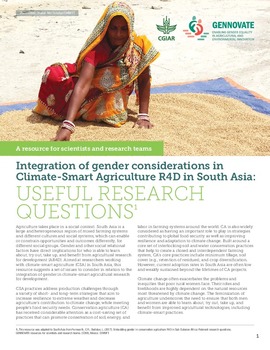Mostrar el registro sencillo del ítem
Integration of gender considerations in climate-smart agriculture R4D in South Asia: useful research questions
| Autor: | Farnworth, C.R. |
| Autor: | Badstue, L.B. |
| Autor: | Jat, M.L. |
| Autor: | Rai, M. |
| Autor: | Agarwal, T. |
| Año: | 2017 |
| URI: | http://hdl.handle.net/10883/19183 |
| Resumen: | Agriculture takes place in a social context. South Asia is a large and heterogeneous region of mixed farming systems and different cultures and social systems, which can enable or constrain opportunities and outcomes differently, for different social groups. Gender and other social relational factors have direct implications for who is able to learn about, try out, take up, and benefit from agricultural research for development (AR4D). Aimed at researchers working with climate-smart agriculture (CSA) in South Asia, this resource suggests a set of issues to consider in relation to the integration of gender in climate-smart agricultural research for development. CSA practices address production challenges through a variety of short- and long-term strategies that aim to increase resilience to extreme weather and decrease agriculture’s contribution to climate change, while meeting people’s food security needs. Conservation agriculture (CA) has received considerable attention as a cost-saving set of practices that can promote conservation of soil, energy, and labor in farming systems around the world. CA is also widely considered as having an important role to play in strategies contributing to global food security as well as improving resilience and adaptation to climate change. Built around a core set of interlocking soil and water conservation practices that help to create a closed and interdependent farming system, CA’s core practices include minimum tillage, soil cover (e.g., retention of residues), and crop diversification. However, current adoption rates in South Asia are often low and weakly sustained beyond the lifetimes of CA projects. Climate change often exacerbates the problems and inequities that poor rural women face. Their roles and livelihoods are highly dependent on the natural resources most threatened by climate change. The feminization of agriculture underscores the need to ensure that both men and women are able to learn about, try out, take up, and benefit from improved agricultural technologies, including climate-smart practices. |
| Formato: | |
| Copyright: | CIMMYT manages Intellectual Assets as International Public Goods. The user is free to download, print, store and share this work. In case you want to translate or create any other derivative work and share or distribute such translation/derivative work, please contact CIMMYT-Knowledge-Center@cgiar.org indicating the work you want to use and the kind of use you intend; CIMMYT will contact you with the suitable license for that purpose. |
| Tipo: | Newsletter / Bulletin |
| Región: | South Asia |
| Lugar de publicación: | Mexico |
| País: | South Asia |
| Agrovoc: | CLIMATE-SMART AGRICULTURE |
| Agrovoc: | GENDER ANALYSIS |
| Agrovoc: | RESEARCH |
Ficheros en el ítem
Este ítem aparece en la(s) siguiente(s) colección(ones)
-
Wheat
Wheat - breeding, phytopathology, physiology, quality, biotech

